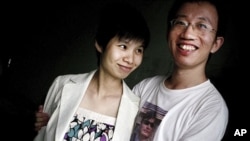Prominent Chinese dissident Hu Jia has been reunited with his family after serving a three-and-a-half-year prison sentence for inciting subversion. But his wife says she fears an existing health condition may have worsened because of his long jail term.
Zeng Jinyan announced on the Internet social network Twitter that her activist husband was released from prison early Sunday.
The 37-year-old Hu Jia remains under house arrest and is under heavy police guard.
Zeng said the couple were happy to be reunited and she was delighted with his release. But she told reporters she feared for her husband's health.
Zeng says before Hu went into prison he had early stage cirrhosis of the liver. She told Reuters they do not know how serious the cirrhosis has become because they have not been given medical reports by the prison authorities. She says her husband has been to the hospital for check-ups and is taking anti-viral medication.
Like dissident artist Ai Weiwei, who was released this past week, Hu has been warned by the authorities he faces further punishment unless he keeps silent and does not talk to news media.
Hu was convicted of inciting subversion of state power in 2008.
During the run-up to the 2008 Beijing Olympics he published an open letter to the Chinese government entitled "The Real China and the Olympics." It called for an end to human rights abuses in the country.
Hu was also a vocal campaigner in the fight against AIDS and spoke out for the hundred of thousands of Chinese affected by the disease.
He was also critical of China's poor environmental policies.
Few believe Hu and Ai Weiwei's release signal a relaxation of the ruling Communist Party's biggest crackdown on dissent in two decades.
The Chinese government has been silencing dissidents since February out of concern that uprisings across the Arab world could also inspire similar political protests and revolts at home.
Scores of activist, rights lawyers and dissidents have disappeared, been placed under house arrest and warned to keep silent, often with threats to their family members.
Some analysts called Ai's release several days ago a calculated attempt to stop public protests and forestall criticism by European governments during Chinese Premier Wen Jiabao's four-day European tour, which began Saturday in Britain.
Beijing strongly denies it has given in to international condemnation to release any of its citizens it believes are a threat to its rule.
Chinese Dissident Released From Prison




